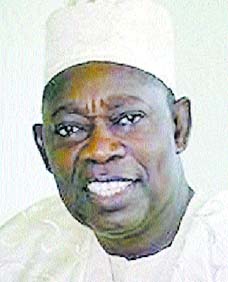


Posted by From MODESTUS CHUKWULAKA, JAMES OJO, JACOB EDI AND BASHIR UMAR, Abuja on



For those in doubt as to who won the June 12, 1993 presidential election between the late business man and philanthropist, Chief Moshood K. Abiola and Alhaji Bashir Othman Tofa, the answer is finally here.
For those in doubt as to who won the June 12, 1993 presidential election between the late business man and philanthropist, Chief Moshood K. Abiola and Alhaji Bashir Othman Tofa, the answer is finally here.
The man, who conducted the election, as chairman of the National Electoral Commission (NEC), Professor Humphrey Nwosu, said Chief Abiola, presidential candidate of the Social Democratic Party (SDP), won the election.
This is even as he exonerated then military president, General Ibrahim Babangida from complicity in the annulment of the election.
In a book he wrote on June 12, 1993 presidential election, entitled, 'Laying the Foundation for Nigeria's Democracy: My Account of June 12, 1993 Presidential Election and its Annulment," which was released in Abuja on Thursday, Prof Nwosu revealed that Abiola scored at least a third of the votes cast in 28 of then 30 states of the federation.
Nwosu said the late politician pooled a total of 8, 323, 305 votes out of a total of the 14, 396,917 cast throughout the federation. He said that Abiola's opponent in the election, Alhaji Tofa of the defunct National Republican Convention (NRC) polled 6, 073, 612 votes, scoring at least one-third of the votes in 23 states.
'Consequently, Alhaji MKO Abiola won the election," Nwosu said in the book.
He said that the defunct NEC, which he chaired, could not announce the result of the election because of the court order served the commission on June 15, three days after the election was held.
However, virtually all the key actors in the nation's political scene during and after the annulled election, including Babangida, who was slated as the guest of honour; Chief Ernest Shonekan, slated to chair the event and Gen. Theophilus Danjuma, billed to be the chief launcher shunned the presentation.
Also, President Umaru Musa Yar'Adua, who was touted as the special guest of honour, was not represented. Only Babangida sent a representative, in the person of the former director of military intelligence, Brig. Gen. Haliru Akilu (retd).
Justifying the commission's decision to obey the injunction stopping it from announcing the results of the election, after ignoring an earlier order stopping it from conducting the election, Nwosu explained that NEC had gone to the Court of Appeal sitting in Kaduna to appeal against the ruling of the Abuja High Court in the belief that a superior court would readily vacate the order.
According to him, the appellate court had acceded to the commission's prayer for an accelerated hearing, which was fixed for June 25, 1993, only for the government to sack the commission on June 23, two days to the day fixed by the court.
Rather than blame Babangida, who had dissolved NEC, Nwosu heaped praises on him in the book and blamed some unnamed people within and outside the military high command for the annulment.
'The greatest support and strength I received was from the President (Babangida). He exhibited the strongest political will and provided adequate financial and moral support that sustained me throughout my tenure as chairman of NEC," he said.
Although book reviewer, Prof. Adele Jinadu, did not totally disagree with Nwosu, he noted, in his review, that blaming a faceless, nameless cabal within and outside the military high command for the annulment suggested that Babangida was a mere figure head who was not in control of the government he headed.
However, Nwosu said rather than set out to unmask those behind the annulment, the book had 'analysed the centrifugal and centripetal forces that combined in various ways to shape as well as influence President Babangida's transition programme."
The book, according to him, has underscored the importance of June 12, 1993 presidential election, which was adjudged by many as the freest, fairest, most peaceful and credible election in Nigeria's history.
He said the conduct, result and annulment of the election had changed the nation's political landscape.
'June 12, 1993 presidential election laid a strong foundation for democracy in Nigeria. In my view, June 12, 1993 was indeed, the real democracy in Nigeria as May 29, 1999 was an offshoot of June 12, 1993," Nwosu said.

